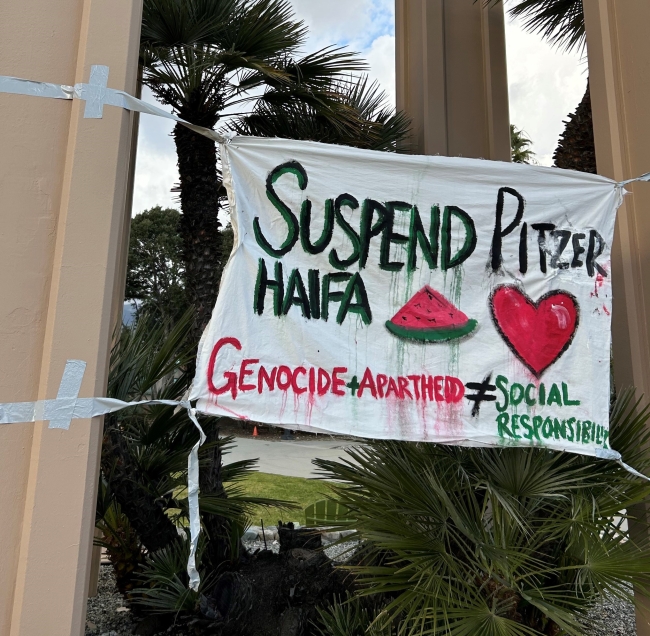You have /5 articles left.
Sign up for a free account or log in.

Some student activists and professors have been advocating for Pitzer College to get rid of its study abroad program in Haifa for years.
Izzy Kramer
Pitzer College, a private, liberal arts institution in California, recently dropped its study abroad program at the University of Haifa in Israel from its list of pre-approved programs.
College officials say the program, along with ten others, was dropped from the list because of low enrollments or other concerns, not because of any particular political stance. But the move was celebrated by pro-Palestinian students, who saw it as the culmination of years of advocacy to stop Pitzer from collaborating with the University of Haifa and a win for the boycott, divestment and sanctions movement.
The Student Senate at Pitzer, which is one of the seven Claremont Colleges, voted in February for Pitzer to cut ties with Israeli universities. Faculty members also voted to end the program in 2018, and the College Council, made up of professors, staff and students, followed suit in 2019, though the move was vetoed by the then president, Melvin Oliver. Multiple groups, including Students for Justice in Palestine, Jewish Voice for Peace and Pitzer Alum for Social Justice, have recently called on the college to join the boycott movement. The alumni group organized a petition in which about 430 alumni and parents of former students pledged not to donate to the college unless it did so.
“We invite every institution of higher education to practice the social justice values it teaches and suspend ties with universities that support apartheid, scholasticide and genocide,” read a statement posted on Instagram by Claremont Students for Justice in Palestine and Jewish Voice for Peace.
Allen M. Omoto, vice president for academic affairs and dean of faculty at Pitzer, wrote in a message to the campus that the Haifa program was one of 11 study abroad programs removed after a vote by the Faculty Executive Committee, based on recommendations from the Academic Planning Committee. Both committees include faculty and students.
These programs no longer “meet our criteria, due, specifically, to lack of enrollments for at least five years, exchange imbalance, or curricular overlap,” Omoto said. “I want to clarify that these programs are not closed, nor do any of these actions reflect an academic boycott,” he added, noting that students can still participate in these programs through a petition process. The programs are “simply no longer pre-approved for enrollment by Pitzer students.”
Wendy Shattuck, Pitzer’s assistant vice president of college communications, wrote in an email to Inside Higher Ed, that the college started developing these criteria for study abroad programs in the 2021–22 academic year and finalized them in March.
Moving forward, “it will be the responsibility of the Senior Director for Study Abroad and International Programs to initiate periodical reviews of our programs as needed to ensure that they provide the best possible learning and growth opportunities for students,” Shattuck said. “Members of the community can also submit proposals, and again, the ultimate decisions will be made through our shared governance structure.”
Some pro-Israel groups didn’t buy that the program’s suspension was purely procedural.
Canary Mission, which describes itself as an antisemitism “watchdog” that “documents individuals and organizations that promote hatred of the USA, Israel and Jews on North American college campuses and beyond,” released a statement calling the move “an appalling antisemitic academic boycott of Israel thinly veiled as an administrative procedure.”
Boycott or Bureaucracy?
A March memo from the Study Abroad and International Programs Committee to the Curriculum Committee and Academic Planning Committee, obtained by Inside Higher Ed, said programs in Brazil, Sweden, Turkey, Germany and elsewhere were suspended due to a “lack of student interest,” among other issues. But the Haifa program was recommended for closure based not just on no enrollment over the last five years but also a lack of “adequate local resources” and “alignment with Pitzer values.”
Claudia Strauss, chair of the Academic Planning Committee and an anthropology professor, said the Haifa program was the only program deemed misaligned with college values.
The memo included a copy of the proposal that came before the Student Senate to shut down the Haifa program and noted that the proposal had “considerable community support.” The proposal alleged that the college should cut ties with the University of Haifa because it “facilitates the research and development of military weapons and surveillance technologies,” supports the war effort by offering scholarships to students drafted in the reserves and disproportionately disciplines Arab students, who make up 40 percent of the student body, among other claims.
Charlotte Wirth, one of the drafters of the proposal, who is also a Students for Justice in Palestine organizer on campus and a voting member of the Study Abroad and International Programs Committee, said the vote to remove the Haifa program was unanimous, and the push for an academic boycott was “brought up during every conversation” about suspending programs.
Bella Jacobs, also a drafter of the proposal and a student organizer with Jewish Voice for Peace and Students for Justice in Palestine, said “the administration is definitely trying to bury this BDS win under the closure of a lot of other programs” when professors and students involved intended for it to be a part of the boycott movement.
Faculty leaders put out a statement on the Israel-Gaza war, approved at a March faculty meeting but released the same week as the announcement about the removal of the program, that doesn’t explicitly mention the program but signals support for severing ties with Israeli higher ed institutions.
“We stand firmly against any form of discrimination targeting Palestinian students and faculty, and the deliberate exclusion of Palestinian perspectives from the curriculum within Israeli universities,” the statement read. “As a result, we will actively discourage any partnerships with institutions that perpetuate such practices.”
David Lloyd, distinguished professor of English at the University of California, Riverside, who has advocated for closing Israeli study abroad programs, said it’s unsurprising campus administrators aren’t eager to publicize participating in an academic boycott. He noted the recent ousting of the presidents of Harvard University and the University of Pennsylvania after a Congressional hearing in December about campus antisemitism and how they’ve handled conflicts between students who support opposing sides of the war.
“Of course, the college is not going to say, ‘we did this because the students organized,’” he said.
Strauss sees the contrasting narratives from students and administrators as signs of “dueling pressures and goals for the different constituencies here,” but she believes both sides’ versions of what happened include some truth. She said the nixed program was the result of a bureaucratic process, but it was students’ activism against the Haifa program that prompted the college to develop guidelines for opening and winding down study abroad programs in the first place.
A National Push
This isn’t the first time study abroad programs in Israel have been a point of contention.
The University of Illinois at Chicago, for example, drew criticism for offering an Israel study abroad program last year. Palestine Legal, an advocacy group that defends supporters of Palestinian rights, filed a civil rights complaint on behalf of students against the university with the U.S. Education Department’s Office for Civil Rights after staff allegedly tried to bar a group of Palestinian students from an information session about the program. In 2018, a University of Michigan professor and a graduate teaching assistant both declined to write letters of recommendation for students applying to study abroad in Israel, drawing support from some colleagues and backlash from others.
Lloyd said students have also been barred from going to Israel for research because of Palestinian ancestry. Israel has also banned boycott proponents from entering the country in the past. For that reason, he believes it’s problematic for public universities in particular “to run a program that on its face discriminates against a number of students.”
Mark Rotenberg, general counsel and vice president of university initiatives at Hillel International, an organization focused on campus Jewish life, said U.S. universities offering Israeli study abroad programs are “quite common.” He estimates “there are probably many dozens if not over 100 of such programs,” as well as many research partnerships between American and Israeli academics.
Just over 2,700 American students went on study abroad programs in Israel in the 2021–22 academic year, according to the 2023 Open Doors Report on International Educational Exchange.
Rotenberg noted that some campuses have temporarily closed their Israel study abroad programs in the past during Hamas attacks on the country as a safety measure, but no U.S. university has ever closed one of these programs as a part of an academic boycott as far as he’s aware.
Hillel representatives have heard from some Jewish students at Pitzer that it’s “social suicide” to study in Israel, so he wasn’t surprised to see the program has been under-enrolled for years.
“That’s a large part of the reason why there’s been so little interest is that enormous social stigma that attaches to Jewish students and other students who wish to identify in any way with Israel or explore Israel from a variety of different standpoints,” he said.
He worries students have been robbed of an educational opportunity.
“Studying at the University of Haifa would offer, actually, an opportunity for people to understand multiculturalism in an Israeli higher ed context,” he said, noting that the University of Haifa enrolls “hundreds” of Arab Muslim and Christian students, and Israeli universities overall enroll Jews from all over the world including the former-Soviet Union, Ethiopia and various Arab countries.
“For universities to restrict those opportunities and to anathematize the opportunity to study and learn in Israeli universities I think is a repudiation of the idea of liberal education and goals of inclusion and diversity,” he said, especially for Jewish students who may want to study in Israel as an expression of their Jewish identity. He believes these programs are increasingly “under attack” but he sees Pitzer as an outlier and doubts other universities are going to get rid of them.
Jacobs, the student who helped draft the proposal to end the program, disagrees that closing the program undermines academic freedom because she believes Israeli universities are “complicit” in the disruption of education in Gaza right now which isn’t “in any way compatible with academic freedom.”
She also emphasized that she’s not against partnerships with individual Israeli scholars or individual students choosing to petition to participate in the Haifa program. The problem is having an “institutionalized relationship with the University of Haifa,” she said.
Wirth, the other proposal drafter, said some disagreement over the suspended program has surfaced on the college’s “free wall” where students can paint messages and artwork. A mural calling for the shuttering of the Haifa program was spray painted over by a message in blue letters that reads, “Travel is education,” she said.
She now wants to see more study abroad programs in Israel shut down.
“I really hope that other schools will follow suit,” she said.





